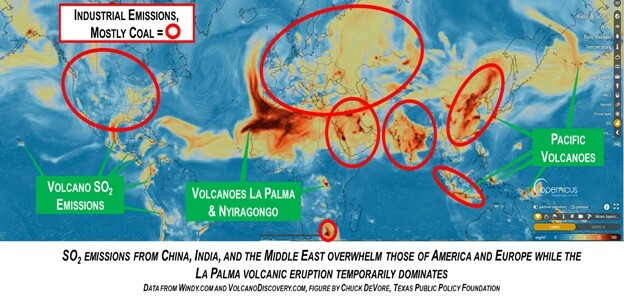The United Nations Climate Change Conference is due to start on Oct. 31 in Glasgow, Scotland — a city built by the coal and steel industries.
Alok Sharma, the president-designate for the conference, was in Paris last Tuesday solemnly declaring that “Responsibility rests with each and every country … because on climate, the world will succeed, or fail as one.” Continuing the theme, one of the conference logos observes “The Climate Has No Borders” — which is great, so far as it goes, but someone forgot to tell China.
It’s Charlie Brown, Lucy, and the football for the dozenth time, with environmental activists and climate bureaucrats playing the part of Charlie Brown; China, a genocide-committing, nuclear-armed Lucy; and the football, China’s promised phasing out of coal.
Now, just two weeks before the climate summit to end all climate summits, China threatens to ruin the whole show. A headline in the left-wing The Guardian says it all: “China’s plan to build more coal-fired plants deals blow to UK’s Cop26 ambitions.” It’s almost as if these grand conferences don’t do a thing — except generate speeches, emissions, and promises to be broken later.
The Guardian further explained its anguish: “China plans to build more coal-fired power plants and has hinted that it will rethink its timetable to slash emissions, in a significant blow to the UK’s ambitions for securing a global agreement on phasing out coal at the Cop26 climate summit in Glasgow.” Chinese Premier Li Keqiang “stressed the importance of regular energy supply, after swathes of the country were plunged into darkness by rolling blackouts that hit factories and homes.”
The Chinese Communist Party understands that blackouts could injure its hold on power. That “the world will succeed, or fail as one” is irrelevant. The Party must go on.
Chinese authorities went on to explain that “energy security” is the basis for a “modern energy system,” and that, given the plentiful abundance of coal in China, “it is important to optimize” its use while intensifying domestic oil and gas exploration. In other words, the world can pound sand, we have a nation to rule.
In the same article from The Guardian, Oxford University’s George Magnus apologized for China’s failure, noting that power outages and economic weakness forced Beijing’s hand — they didn’t want to build more coal-fired power plants and mine more of the black stuff, they had to do it! Note to Mr. Magnus: The Chinese Communist Party never intended to phase out coal, ever.
Putting the global use of coal into perspective, the People’s Republic of China built 29.8 gigawatts (GW) of coal-fired power plants for its domestic use last year, on top of 44 GW in 2019. Currently, China is building or planning to build as much coal-fired power as currently exists in the entire United States.
On Nov. 18, 2019, the Navajo Generating Station, the largest coal-fired power plant west of the Mississippi, shut down in Page, Arizona. The plant and the nearby Kayenta Mine that kept it powered used to employ roughly 1,000 workers, most of whom were members of the Navajo Nation or the Hopi Tribe. The plant’s three boilers could generate 2.25 GW of power used to move prodigious amounts of Colorado River water to Arizona’s thirsty cities and farms as well as power the air conditioners that make life in much of the Grand Canyon State livable.
After hundreds of millions of dollars in pollution control upgrades, the Navajo plant was one of the cleanest coal-powered generators in the world. But reducing pollution that harms human health is no longer enough — zeroing out greenhouse gas emissions has become the new, unattainable goal.
Kevin Dahl, the spokesman for the National Parks Conservation Association, welcomed the Navajo plant’s closure. “The production of greenhouse gases is warming our planet, indisputably,” he said. “We have to be smart about this and move quickly.”
Dahl and most environmentalists have been largely silent on China’s coal power-plant building spree, even though China’s additions to emissions dwarf reductions made by the West. The Navajo plant was America’s third-largest contributor to greenhouse gas emissions. When it was shut down in 2019, China was building new coal plants so quickly that the global reduction in greenhouse gas emission from Navajo’s closure was eclipsed by new Chinese coal plants in 19 days — and 20 times throughout the course of the year.
The global nature of a claimed climate change challenge comes sharply into focus when looking at sulfur dioxide (SO2) emissions as detected by satellites. SO2 is mostly emitted by the use of coal and to a lesser degree, petroleum. This map, derived from Windy.com, shows SO2 emissions in China, India, and the Middle East at about 20 times the concentration of that in the United States and Europe.
While many of the coal-fired power plants in the West have scrubbers that remove SO2 from smokestacks, other nations use older technology or don’t always turn on the costly scrubbers. You can see it in their emissions. As an interesting side note, the La Palma volcano now erupting in Spain’s Canary Islands puts all the world’s SO2 emissions to shame.

The People’s Republic of China jails or ejects independent environmentalists while the West often elects them. Hence, all the action for this “global” problem will remain in the West, increasing the costs of fuel, electricity, and goods for those least able to afford it. At the same time, the West continues handing the economic advantage of less expensive, more reliable energy to China’s brutal communist dictatorship.